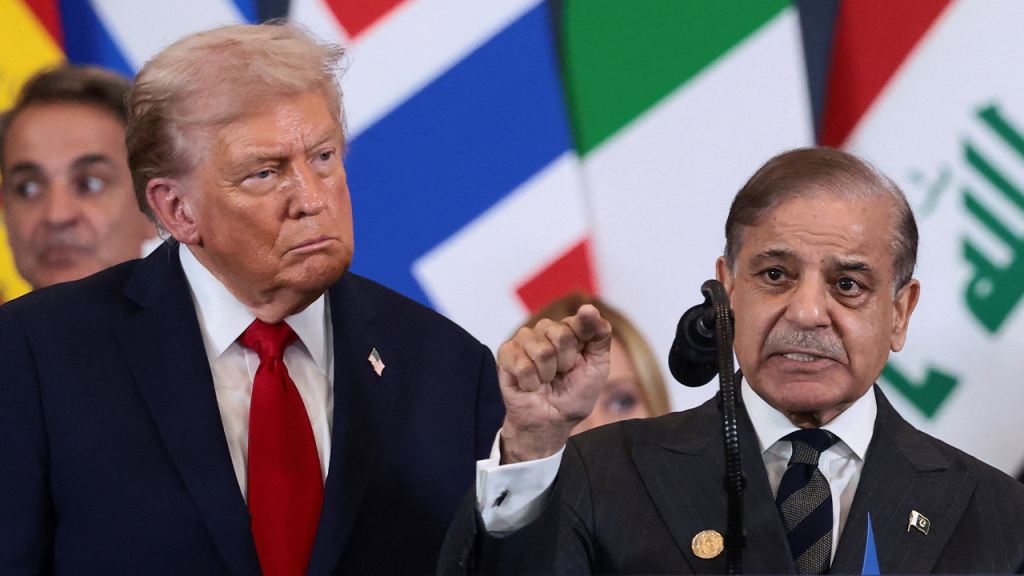Pakistan’s PM Nominates Trump for Nobel Peace Prize After Gaza Ceasefire
In a significant diplomatic gesture, Pakistani Prime Minister Shehbaz Sharif announced his intention to nominate former President Donald Trump for the Nobel Peace Prize. Speaking at a gathering of world leaders in Egypt’s coastal resort of Sharm el-Sheikh, Sharif praised Trump’s pivotal role in securing the recent ceasefire and hostage agreement between Hamas and Israel. This marks the second time Pakistan has put forward Trump’s name for the prestigious award, following a previous nomination in June for his efforts in de-escalating tensions between Pakistan and India. The announcement came as both leaders participated in a ceremony to sign documents related to the Gaza peace deal, highlighting Trump’s growing influence in international peacemaking efforts.
“Pakistan had nominated President Donald Trump for the Nobel Peace Prize for his outstanding, extraordinary contributions to first stop the war between India and Pakistan and then achieve a ceasefire,” Sharif stated, standing beside Trump at the international gathering. He continued with evident admiration, “Today, again, I would like to nominate this great president for the Nobel Peace Prize because I genuinely feel that he is the most genuine and most wonderful candidate for the Peace Prize.” Sharif emphasized that Trump’s diplomatic interventions have saved countless lives, not only in South Asia but now also in the Middle East through the Gaza agreement. The Pakistani leader even made a brief saluting gesture toward Trump, symbolizing his respect for what he described as “exemplary, visionary leadership” on the world stage.
Prime Minister Sharif’s praise for Trump went beyond the formal nomination, as he proclaimed, “Mr. President, I would like to salute you for your exemplary, visionary leadership. I think you are the man this world needs most at this point in time.” This enthusiastic endorsement reflects a growing sentiment among certain international leaders who view Trump’s direct approach to diplomacy as effective in breaking deadlocks in long-standing conflicts. Sharif’s declaration that “the world will always remember you as a man who did everything — who went out of his way to stop seven and, today, eight wars” positions Trump as a transformative figure in global peacemaking, despite the controversies that have often surrounded his foreign policy decisions during and after his presidency.
The timing of this nomination announcement is particularly notable, coming just days after the Nobel Committee in Norway awarded the Nobel Peace Prize to Venezuelan opposition leader María Corina Machado. In an apparent reference to this decision, Trump seemed to express disapproval during the ceremony, remarking “Oh, Norway — aye, yay, yay. Norway. What happened, Norway? What happened?” This comment highlights the complex relationship between political figures and the Nobel Prize selection process, which has often been criticized for its perceived political leanings. Trump’s reaction suggests he may have been expecting recognition for his role in the Middle East peace process, a sentiment clearly shared by Prime Minister Sharif and potentially other leaders in attendance.
The Gaza ceasefire agreement represents a significant diplomatic achievement, one that Trump has characterized as “achieving the impossible.” The deal, which facilitates the release of hostages and provides humanitarian aid to Gaza, came after months of devastating conflict that has claimed thousands of lives. Trump’s involvement in the negotiations demonstrates his continued influence in international affairs even after leaving office, and reinforces his self-portrayal as a dealmaker capable of resolving intractable conflicts. The gathering in Sharm el-Sheikh brought together an impressive array of world leaders, underscoring the global significance of the agreement and providing a high-profile platform for Sharif’s nomination announcement.
Pakistan’s repeated nomination of Trump for the Nobel Peace Prize reflects not only an appreciation for his diplomatic interventions but also suggests a strategic alignment with the former president at a time of shifting global alliances. Sharif’s government, facing numerous domestic and regional challenges, appears to be cultivating a relationship with Trump, perhaps anticipating his potential return to power in the United States. The nomination also serves to highlight Pakistan’s own role in peace processes, positioning itself as a responsible actor in international diplomacy despite its complicated relationships with neighbors like India and Afghanistan. By associating with Trump’s peacemaking efforts, Pakistan may be seeking to enhance its international standing and leverage in regional negotiations.
As the world processes this latest diplomatic development, questions inevitably arise about the likelihood of Trump actually receiving the Nobel Peace Prize. The selection process is notoriously opaque and influenced by various political considerations. While Trump’s supporters point to concrete achievements like the Abraham Accords, the Gaza ceasefire, and now the Pakistani acknowledgment of his role in South Asian peace, his detractors emphasize other aspects of his foreign policy that they view as destabilizing. Regardless of whether this nomination leads to the award, Sharif’s public endorsement of Trump as “the man this world needs most at this point in time” represents a significant vote of confidence from a leader in a strategically important region. It adds another dimension to Trump’s complex legacy in international affairs and may influence how his diplomatic achievements are remembered in the years to come.


